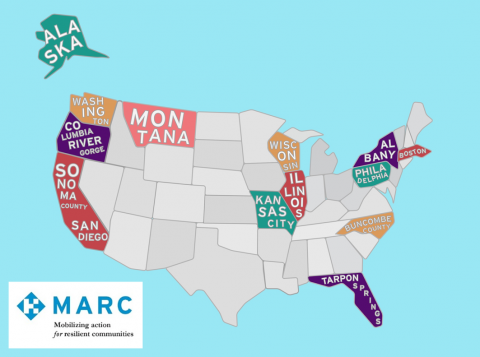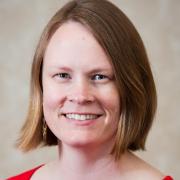
This map was designed by Samantha Slade for the MARC program.
Mobilizing Action for Resilient Communities: Creating a just, healthy and resilient world
The term Adverse Childhood Experiences—or ACEs—comes from a ground-breaking study first published in the 1990s by the Centers for Disease Control and Prevention and Kaiser Permanente. Two physicians, Robert Anda and Vincent Felitti, developed a questionnaire asking about 10 different types of traumatic experiences you might have had in childhood. The questionnaire was given to more than 17,000 mid-life adults and their answers were linked to additional questions about their behaviors and physical and mental health histories. The results stunned the researchers.
The ACE Study, and countless others since then, found irrefutable evidence that the stress of childhood trauma can have a lifelong impact—physically, emotionally, and socially. High ACE scores (usually 4 or more on a scale of 0-10) are linked to many social and health risk behaviors and almost every leading cause of morbidity and mortality. Someone with an ACE score of 6 has a life expectancy that's nearly 20 years less than someone with an ACE score of zero. Studies have also shown that childhood trauma is extremely prevalent: Nearly two-thirds of the original study’s participants reported one or more ACEs.
So, the bad news is that ACEs are common and can have a devastating impact on health and well-being. Much more important, however, is all the good news. First, adversity is not destiny. People can get the support they need to help heal from early childhood adversity. Even some of the physiological effects of chronic stress seen in the brain and body can reverse. Second, ACEs are preventable. There is so much we can do before traumatic experiences happen--such as promoting safe, stable and nurturing relationships and environments. This leads us to the third piece of good news: ACEs are bringing people together. The science gives us a unifying language—and because the effects of childhood trauma extend beyond health and health care, a lot of people, organizations, entire sectors and communities, are getting involved.
As people learn the science behind ACEs and resilience, they are inspired to act. There are countless stories of “aha moments” where things have clicked for someone—understanding that experiences in childhood impact the decisions we make, the health problems we face, and other issues that burden us in our adult lives. People are realizing that there are changes we can make, both big and small, to prevent childhood trauma. They’re getting involved, coming together, and building the movement to create a just, healthy and resilient world.
The Mobilizing Action for Resilient Communities (MARC) program brings together 14 sites actively engaged in this movement. A mix of cities, counties, regions, and states, these communities are all turning the science of ACEs and resilience into practices and policies with the potential to transform every aspect of human life.
MARC communities have long been acting on a commitment to trauma-informed change, establishing strong networks that include educators, physicians, social service providers, researchers, elected officials, first responders, parents and youth. They have raised awareness with websites, social media, summits, and trainings about how early trauma, such as neglect, abuse and abandonment, can leave long-term tracks in the developing body and brain. More importantly, they have spread the word about how we can both prevent and heal those wounds.
Now, through MARC, community representatives are participating in a virtual learning collaborative. They share notes, identify best practices, and develop ways to gauge the impact of their work. MARC communities also receive financial investment and technical assistance to further advance their local ACE-informed agendas through innovative next steps to strengthen their networks. The goal is for each of these communities to make progress towards system-wide changes—from early childhood education to aging services, from healthcare to juvenile justice—and to become models for others who wish to do the same.
To learn more about what’s going on in the MARC communities and to find one near you, please visit marc.healthfederation.org. Check the site for monthly “Shared Learnings”—insight from the MARC communities regarding network development, the science of ACEs and resilience, communications, policy, and evaluation—to help build and accelerate the movement in your own community.
MARC is coordinated by The Health Federation of Philadelphia with generous support from the Robert Wood Johnson Foundation and The California Endowment.



The views and opinions expressed in this post are those of the author(s) and do not necessarily reflect those of MomsRising.org.
MomsRising.org strongly encourages our readers to post comments in response to blog posts. We value diversity of opinions and perspectives. Our goals for this space are to be educational, thought-provoking, and respectful. So we actively moderate comments and we reserve the right to edit or remove comments that undermine these goals. Thanks!